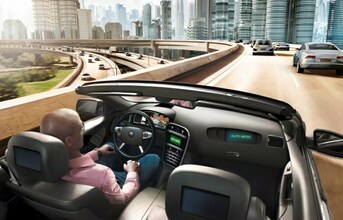
Continental is involved in a variety of work packages with experts of its Chassis & Safety and Inte-rior Divisions. For example, Continental is involved in the design of interfaces for a cross-company exchange of information on surroundings and location via the server and to visualize the relative and absolute position of the vehicle (precise position within the lane).
Continental builds on its "Motion Information to X Provider" (M2XPro) concept for the networking of driving dynamics sensors with Global Navigation Satellite System (GNSS) information complemented with recognized landmarks. A further focus of research for Continental is on new system functions that play an important role in the cooperative interaction of vehicles.
This focus is on lane changing, safe following distances and driving maneuvers at the end of lanes. In addition, testing equipment and validation methods for automated driving are being developed, which for example work on the basis of simulations. Continental is also planning to incorporate vehicles into the project, to test their communications and driving functions and to devise testing methods.
On the way to automated driving
The car of the future will offer automated driving in more and more driving situations, for example in traffic jams or near roadworks. Depending on the driving situation, the driver will be able to hand over the task of driving to the vehicle. As a systems supplier, Continental is ideally placed to de¬velop solutions for automated driving and put them into series production. The fully automated car will however not appear overnight: advanced driver assistance systems on the market today represent the first step in this direction, and will allow an evolutionary development of future automation stages.
This evolution will need a lot more research and development work, even though Continental can already look back on many years of development activity in the field of automation. For example, in 2011 the company already developed a highly automated assistant for driving in slow-moving traffic and near roadworks, as part of the EU research project HAVEit.
Research projects like PRORETA 1 to 4, AKTIV or AdaptIVe, and participation in the DARPA Urban Challenge are just as important as a license for testing automated driving on public roads in Nevada, USA. In December 2012, Continental was the world's first automotive supplier to receive this license for a test vehicle.
END



























